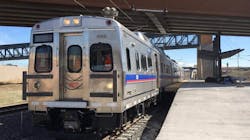RTD receives two federal approvals required for G Line
The Federal Railroad Administration (FRA) granted the Regional Transportation District (RTD) of Denver two key approvals needed before it opens for revenue service.
FRA approved revenue service demonstration of the commuter rail line to Wheat Ridge, Arvada and Adams County, as well as adding the G Line to an existing long-term waiver for the University of Colorado A Line and B Line. RTD explains that revenue service demonstration is an important step in the certification process for Positive Train Control and is how the FRA determines if trains are operating in a test environment or if they are operating in a live, public service environment.
RTD says these approvals represent substantial landmarks in the approval process, which includes several additional steps at both the federal and state levels.
“Today’s news represents huge milestones, and I credit all of the collaborative work with our partners that has made it possible,” said RTD CEO and General Manager Dave Genova. “We remain committed to meeting the requirements of our regulators and will continue working closely with them, as well as keeping the public involved at every turn.”
RTD will continue to pursue necessary steps to implement quiet zones along the 11.2-mile line. Crossing attendants also must remain along the G Line as RTD and concessionaire Denver Transit Partners (DTP) work through items outlined in a plan submitted to FRA on Dec. 14, 2018.
In December, RTD and DTP provided an update on the implementation of quiet zones along the University of Colorado A Line and the G Line. At the time, Genova explained the main issue with obtaining clearance for the quiet zones is that the RTD system does not provide constant warning time. RTD has submitted waiver requests and as soon as those waivers are approved, RTD will work with local jurisdictions to file the required notice of establishment. Regarding the opening the G Line for revenue service, Genova said DTP will continue to adjust and optimize the grade-crossing timing and, once optimized to an acceptable level, that activation time will need to be field verified by FRA and Colorado Public Utilities Commission before service can begin.
About the Author

Mischa Wanek-Libman
Group Editorial Director
Mischa Wanek-Libman is director of communications with Transdev North America. She has more than 20 years of experience working in the transportation industry covering construction projects, engineering challenges, transit and rail operations and best practices.
Wanek-Libman has held top editorial positions at freight rail and public transportation business-to-business publications including as editor-in-chief and editorial director of Mass Transit from 2018-2024. She has been recognized for editorial excellence through her individual work, as well as for collaborative content.
She is an active member of the American Public Transportation Association's Marketing and Communications Committee and served 14 years as a Board Observer on the National Railroad Construction and Maintenance Association (NRC) Board of Directors.
She is a graduate of Drake University in Des Moines, Iowa, where she earned a Bachelor of Arts degree in Journalism and Mass Communication.
